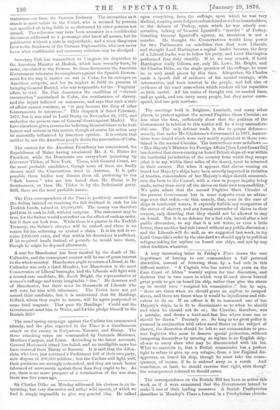The meetings held in Brighton, Lambeth, and many other places,
to protest against the second Fugitive Slave Circular, no less than the first, sufficiently show that the position of the Government in relation to this matter will be a very uncomfort- able one. The only defence made is the tu quoque defence— namely, that under Mr. Gladstone's Government in 1871, instruc- tions were issued which were very nearly equivalent to those con- tained in the second Circular. The instructions were as follows :— "Her Majesty's Minister for Foreign Affairs [then Lord Granville3 has decided that slaves coming on board British ships-of-war within the territorial jurisdiction of the country from which they escape (that is to say, within three miles of the shore), must be returned. to their owners. But when it appears that slaves coming on board her Majesty's ships have been secretly imported in violation of treaties, commanders of her Majesty's ships should communi- cate the facts to the Consul, with a view to proper inquiry being made, rather than carry off the slaves on their own responsibility.' We quite admit that the second Fugitive Slave Circular of the present Government has in some respects even an advan- tage over that order,—in this, namely, that, even in the case of ships in territorial waters, it expressly forbids any recognition of the status of slavery, and any formal surrender of slaves to their. owners, only directing that they should not be allowed to stay on board. But it is no defence for a bad rule, issued after a hot public discussion, to say that it is not worse, or even a little better, than another bad rule issued without any public discussion and the Liberals will do well, as we suggested last week, to try- Lord Granville's order by the standard we should apply to political refugees asking for asylum on board our ships, and not by any- other tradition whatever.






































 Previous page
Previous page